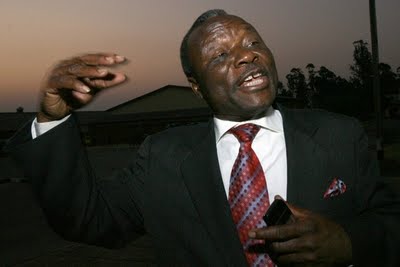


 GOVERNMENT is unhappy with the way the National Social Security Authority (NSSA) is being run and is contemplating a major shake-up at the pay-as-you-go pension scheme once a new board has been put in place, the Financial Gazette can exclusively reveal.
GOVERNMENT is unhappy with the way the National Social Security Authority (NSSA) is being run and is contemplating a major shake-up at the pay-as-you-go pension scheme once a new board has been put in place, the Financial Gazette can exclusively reveal.
A statutory body established in terms of the NSSA Act of 1989 to provide social security, the authority has of late come under heavy fire for making poor investment decisions that have done little to improve the welfare of pensioners. On an annual basis, NSSA pays out total pension premiums of about US$83 million. Retrenchment pensioners are paid US$60, while the survivors’ pension, invalidity pension and children allowances are paid at US$30. On the death of a member, NSSA pays US$300 in funeral grants.
Despite being heavily invested in every sector of the economy, NSSA has been criticised for not fully meeting the needs of its stakeholders who are struggling to make ends meet. To add insult to injury, the authority has burnt its fingers in several of its investments that have struggled to live up to expectations owing to the harsh economic terrain. While much of the blame has been heaped on the NSSA board whose main responsibility has been to direct policy, government believes that the buck should stop with management at the end of the day.
The Innocent Chagonda-led board has already exited NSSA following the expiry of its term of office. Now that the Chagonda-led board is already out of the way, Public Service, Labour and Social Welfare Minister Nicholas Goche is under pressure from his colleagues in government to put in place a new board whose immediate task would be to restructure the authority and get rid of perceived deadwood.
With President Robert Mugabe’s administration now focusing more on the performance of its potential money spinning State-owned enterprises to escape a crippling liquidity crunch as opposed to politicking, the spotlight is now on the NSSA management led by James Matiza. Matiza who has been the general manager of NSSA since 2009 has been quizzed several times, along with his management team, by the Parliamentary Portfolio Committee on Public Accounts over a number of investment decisions made by the authority.
Highly-placed sources told the Financial Gazette that there is also disquiet in the Executive over the way NSSA has been conducting its business, especially how the authority has been exposed to several banks that are struggling to repay loans as well as its investments in non-performing companies as well as non-profitable properties. Ngoni Masoka, the permanent secretary in the Ministry of Labour who is presently performing the functions of the NSSA board declined to respond to questions posed by the Financial Gazette.
While he had demanded that the questions be put in writing, Masoka had not provided responses to the written enquiries sent to him on Tuesday by the time of going to print. Efforts to get comment from Goche were futile while Matiza could also not be reached for comment as he was said not to be at work and would only be back in the office on Monday. Several investments made by NSSA have courted the ire of its stakeholders.
While NSSA has invested in Ekusileni Medical Centre, South Medical Chitungwiza and many other projects, these have created challenges for the institution. The multi-million dollar Ekusile Medical Centre in Bulawayo lies idle years after construction. The hospital closed down soon after opening briefly in 2004. NSSA is also battling to secure its investment in Capital Bank, formerly ReNaissance Merchant Bank: the authority is at risk of losing US$50 million in the struggling bank.
NSSA’s investment in a hotel project in Beitbridge has also set tongues wagging amid indications that it may take 29 years before it recoups its investment. Top management at NSSA are also being accused of awarding themselves generous loans from what are effectively public funds at the State-run pension scheme. Eight of them are understood to be owing NSSA more than US$1,7 million in outstanding loan repayments while other employees owe the institution a combined US$18,9 million, bringing the total internal staff lending to about US$24 million.
While the cost of money on the local market can be quoted as high as 35 percent, staff at NSSA are getting loans for as little as three percent per annum for top managers and five percent for other workers. NSSA has also been criticised for its investment in Joina City, a plush property in central Harare. Despite advise to the contrary, NSSA invested about US$11 million of public funds into buying 3 621 shares in Dubury (Private) Limited — an unlisted private investment company which owns Joina City shopping mall.
Under the deal, the State-owned entity is said to have misled external auditors, the public and government over the purchase of 36,21 percent shares in Dubury. The investment was split into two parts, part of which was a loan to anonymous shareholders. This was at variance with the company’s audit results for December 31, 2012. This loan to shareholders is accruing at an interest of two percent per annum and capital repayment would only be done if there are sufficient cash reserves after the repayment of the loans to settle any current creditors.
While NSSA is said to have invested in Joina City to access rental income, it blundered by buying into a vehicle that had no direct ownership on the property.
Matiza publicly denied this recently, saying the Dubury deal was done above board and maintained that the share prices were normal, though admitting that no valuation was done prior to the deal.
“The position which was given to the auditors that NSSA holds 36,21 percent shares in Dubury during the 2012 audit report period was correct and it is still correct, therefore there was no intention to mislead the auditors,” he was quoted saying.
“The investment of US$11 million into Dubury was regarded as one investment from Dubury Investments’ point of view and the main objective was to acquire 20 percent shareholding of Joina City which was done. Shareholders’ loan was the amount owed to previous shareholders by Joina City which was equitably divided among shareholders as part of acquiring Joina City shareholding.
“Share price of a property is determined by the value of the property itself and the number of shares in issue and the percentage of each shareholder.
“Therefore, according to this transaction it is very possible to have any price depending on the above analysis,” he said.
He added: “There was no share valuation which was done in this transaction because valuation was done based on the property valuation which was carried by an independent reputable company CBRE which was chosen through the normal NSSA property investments procedures.”
newsdesk@fingaz.co.zw